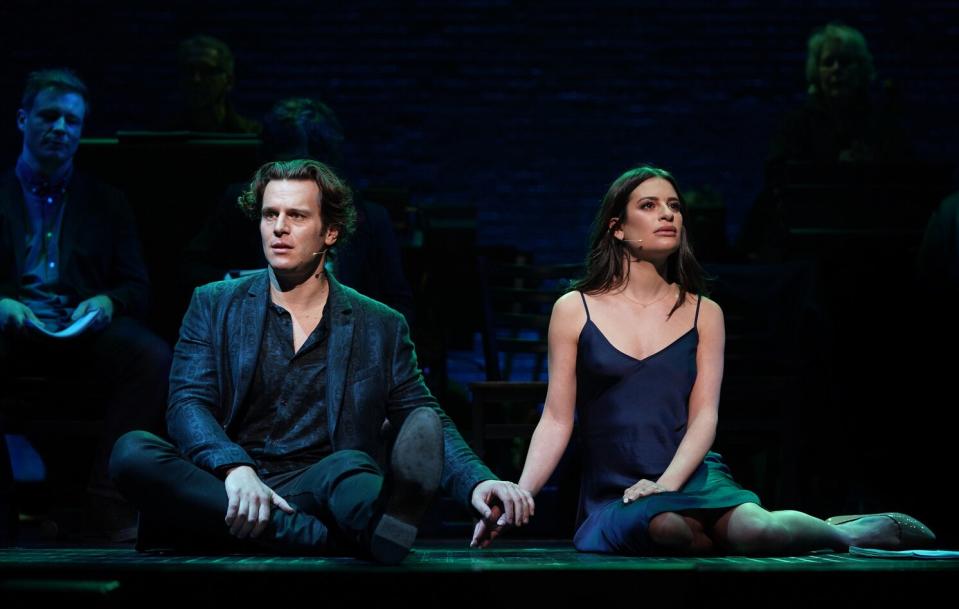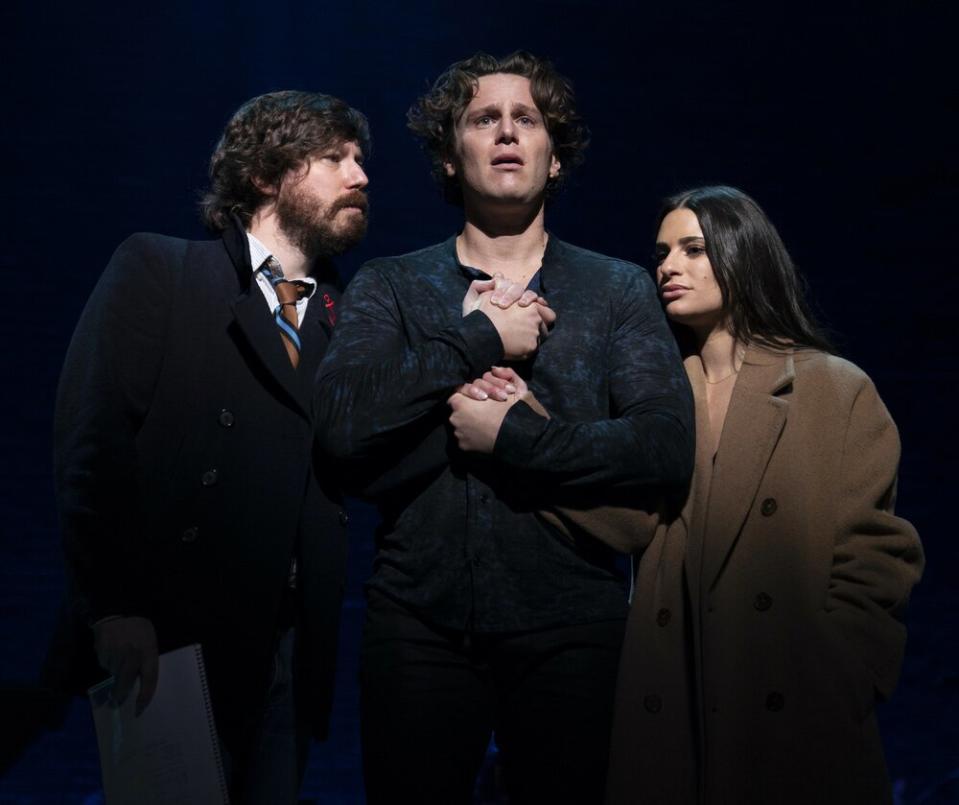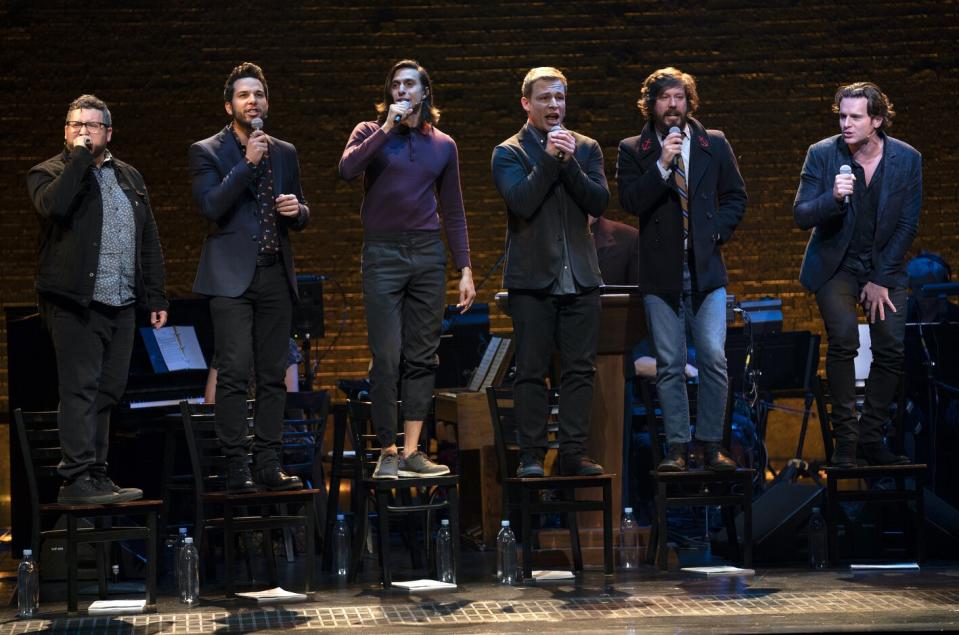Lea Michele once let Jonathan Groff explore the word of her body

- Oops!Something went wrong.Please try again later.
- Oops!Something went wrong.Please try again later.
- Oops!Something went wrong.Please try again later.
We've all got our junk — and when it comes to Lea Michele and Jonathan Groff, their junk is each other.
In the new HBO documentary Spring Awakening: Those You've Known, the two actors reunite along with the rest of the hit musical's original cast to mount a 15th-anniversary concert of Spring Awakening. The film showcases the concert and explores the history of the show's journey to the stage, its unlikely success, and its legacy.
There are plenty of gems and surprises for Spring Awakening fans, but perhaps none more out of nowhere than Michele's revelation that she once let Groff see her vagina, using a desk lamp to give him an illustrative lesson and satisfy his curiosity in the female anatomy as a gay man with no practical knowledge of its particulars.
Though the two are notoriously close and bonded over the explicit love scenes and dramatic trauma they shared on stage 15 years ago, it's still is a bit shocking — particularly that Michele would decide to disclose such a story.

HBO Jonathan Groff and Lea Michele in 'Spring Awakening: Those You've Known'
When we asked Michele and Groff what propelled them to do so, Groff began laughing uncontrollably, his shoulders shaking as he tried to contain himself. But Michele said it was a function of the wonderful environment that the show, the concert, and the documentary came out of.
"Honestly, the great thing about this documentary is it's a wonderful microscope into who we are as individuals, and not just who people think we might be," she said. "Radical Media and the incredible production team behind this documentary, we felt so safe and comfortable with them."
She continued: "It was so wonderful to talk about this material as an adult and get asked real serious questions. Not like, 'What's it like to have sex with Jonathan Groff every night?' So I just felt really comfortable with them. With that level of comfortability came a story of just what goes on behind closed doors between me and Jonathan Groff. That's only one of them. There's a lot of other things."
Groff, finally managing to get a handle on his giggles, added, "There's a lot more than that story, for sure."
"That was like a Thursday," Michele said with a laugh.
The documentary is both a stunning capture of the concert, which took place in November 2021 as a fundraiser for the the Actors Fund, and a glimpse into the lives of the incredibly talented cast it launched into the industry, including Tony nominee Lilli Cooper, film and TV star Skylar Astin, Tony winner John Gallegher Jr., and stage star Gideon Glick.
We caught up with Michele and Groff ahead of the May 3 debut of Those You've Known to talk about getting the gang back together, how the show's impact has shifted over the last 15 years, and what it was like to do it all over again.
ENTERTAINMENT WEEKLY: When you were first approached about doing the concert and documentary, was it immediate yes? Or was there some apprehension?
LEA MICHELE: This was all because of Lauren Pritchard, who is in Spring Awakening and she plays Ilsa. She had a dream that we were all reunited on stage doing a concert benefit performance of Spring Awakening, and she called Jonathan and said, "We need to do this. We need to all get together." So they had this idea and this dream of getting the whole cast together. I remember Jonathan calling me and being like, "I talked to Lauren, I think that like we're trying to make this thing happen." Of course my immediate answer was like, "Absolutely yes!" but I really didn't know if it would be possible. We were still deep in the pandemic. The cast is spread out all across the country. It was a visceral yes, but I had doubts that we would be able to put everything together, mainly because of the COVID of it all. But then through the magic of Jonathan and Lauren, once this became a reality, everyone said yes just as fast right? You tell the story.
JONATHAN GROFF: Immediately. It was like not even a hesitation. It still boggles my mind that we had the entire original cast and the entire original band. Our director, Michael Mayer, came back to direct the night. Brian Ronan, our sound designer, was there. We had Christine Jones, our set designer; we had Susan Hilferty, who did costumes. Kevin Adams did the lighting, who [originally] lit the show. The entire team came back. It was a really beautiful thing because everyone was feeling very reflective during the lockdown. Everybody's schedules were free because of the lockdown. It was beautiful timing, and the scenario never would have happened without the pause of COVID. We were all reflecting on how much this show meant to us and how it changed all of our lives, from the cast to the band to the creative team. Everybody was ready to be in a room again and look at each other and say, "Look what we did. Look what happened here. Let's revisit this. Let's revisit each other." The most important piece was that it was a benefit for the Actors Fund, who had given over $24 million over the last year and a half during the lockdown to everyone in our industry that lost their jobs suddenly because of COVID.
MICHELE: Very close to this all coming together, Jonathan was like, "And we should probably film it, right?" And I was like, "We have to film it!" Radical Media came and filmed the entire experience. And now we have this documentary that not only shows a great time capsule of what Spring Awakening was on Broadway in 2006, but what our benefit concert was like in 2021, and also a great telling of the story of Spring Awakening, whether you're a diehard fan or you've never seen the show before. It's now bringing this incredible musical to this generation.
Had you sang any of these songs together since you left the show?
GROFF: Yes.
MICHELE: What?! Where?
GROFF: I really remember it because this was the first time that we had sang a song from Spring Awakening, and I couldn't stop crying.
MICHELE: Oh, for Michael Mayer?
GROFF: For [producer] Tom Hulce.
MICHELE: Right, But Michael asked us to do it. It was a benefit for Tom Hulce, who is our producer of Spring Awakening. They were honoring him and Michael had gathered cast members from each of the shows that Tom has produced, and Michael asked Jonathan and I to do "Word of Your Body." I was pregnant but we didn't know.
GROFF: And we started singing it and I was like… [vocalizes a sob]. It stuck in my throat like, "Oh, whoa, this material is deep down in my emotions in a way that I didn't even realize until I'm starting to sing it again." This was our experience during the reunion concert as well.
MICHELE: Amplified.

HBO 'Spring Awakening: Those You've Known'
Did you ever throw around the idea of doing a Spring Awakening number when you were on Glee together, or would that have been too meta?
MICHELE: Honestly, I talked about this a little bit in the documentary, but doing the subject matter of Spring Awakening every night was really heavy. It was hard as an actor to have to go to the depths of that every night emotionally. I came off stage one night and I turned to Jonathan and I was like, "I can't do this. I'm ready to move on. I just want to do something happy. I want to do the happiest show on earth, where I do big, bright musical numbers with Kristin Chenoweth." Sure enough, we ended up doing Glee together a month later. But we were excited to sing other songs and do other material, outside of what we had been doing already for two years.
You share some very frank, even explicit stuff here. What prompted that?
GROFF: It all came together so fast. That was perhaps part of it. And it was so emotional to come back. There was something about having cameras on us as adults looking back. When we were kids, people felt uncomfortable to ask us certain questions about the show. So to be able to speak on the show and talk about what we went through personally and professionally was a real honor. We felt really lucky to be able to reflect on it in that way. We just are so ourselves, and [Those You've Known director] Michael [John Warren] managed to capture the essence. I was so thrilled when I watched it for the first time. He really got everybody's essence and personality. It's not just sound bites about the experience; when you watch this documentary, you feel people's souls as they speak about what the experience was like for them.
I love the story you all share of sneaking into the theater after hours when John Gallagher Jr. was wrapping up his run in the show. Did people know about that before or right away, or was it a revelation here?
MICHELE: No, no one knew. We have talked about it, though, publicly — the fact that we were able to hide in the theater post-show and spend the night running around the wings and on the stage. It was an incredible, incredible night, and watching the documentary and looking at those photos of us so young on the stage, just the three of us. I saw the documentary for the first time last night. Myself and Gallagher and Groff went out to dinner afterwards, and we were like, "We were so young." It was wonderful to have this opportunity 15 years later to come back as adults and reintroduce ourselves to each other — to who we are now, some of us are parents and wives. We were reuniting, and it was really wonderful and such a joyous healing experience.
Melchior, as the one left standing, has the biggest growth and character arc. Jonathan, did you feel you understood him better now with 15 years of perspective and maturity?
GROFF: The character of Melchior felt, when I was 21, like everything I wished I was. He gave me a personal inner strength and confidence that I didn't have in my real life. Coming back to do it again, I felt it again. It was like touching a power source or touching on truth. He doesn't let the world define him. He's so strong, he's so outspoken. I could use a reminder of him in my life every day. The material, going back to it, there were certain things where we were like, "This is what this means." Singing, "Oh, you're going to be wounded. Oh, I'm going to be your wound" with 15 years of life and the ways that we've been wounded over the last 15 years, collectively and separately, looking back at that you're like, "Whoa, for young people to be forecasting that wound is so deep." But there was a familiarity and almost an empowerment. These characters are so complex and so grown up. That we got to play these characters at such a young age, they're still challenging as adults. These scenes require a lot from anyone performing them. Just to be reminded of the depth of that material and the power of that material, it didn't feel different, but it was like, "Oh wow, we were really going for it here." Emotionally, the last 10 minutes of the show is insane. John Gallagher talking about [Moritz's] suicide, and Lauren and Lilli sharing their stories — they were asking a lot of the young actors, and we were giving it.

HBO 'Spring Awakening: Those You've Known'
The end credits where you're all getting on the bus and Jonathan, you give the call-out of "There's a moment you know" and the entire street starts singing "Totally F--ed" — what was that like? Because it looks magical. I was dying to be in that street.
GROFF: It was so cooooool. The audience was a huge part of that night. When we got in that theater, we realized that this show means just as much, if not more, to the fans. They went insane. And to go out the stage door. I mean, we went out the stage door, and talking to young people, that was just as important as doing the show to us back then. Because we were the same age as the fans. So there was this communal aspect to that experience that can't be paralleled because we were all young people. That was like a whiff of that memory. There was a connectivity and a youthfulness that I felt plugged into, that also when we did "Totally F--ed" that night in the concert, [it] was like, "Whoa." It was crazy.
You both have had incredible careers since the show. But one thing I was struck by watching this was how amazing everyone in this cast's careers have been. You don't always see that happen. What was in the water with you all?
MICHELE: It really comes back to Michael Mayer and Jim Carnahan, our casting director. They were able to look beyond all of the hair gel in Jonathan's hair. He had this star quality behind all of that; Michael has an eye for that.
GROFF: [Laughs]
MICHELE: Michael was really able to see what we were all capable of then and what that would then become. It was so unbelievable watching Lilli Cooper in the documentary; Lilli had her son shortly after I had my son, and to see her stand on that stage and sing, now as a Tony Award nominee, and a woman and a mom, it was so unbelievably inspiring. She's such a force. We were this cast of young adults, and now seeing everyone as adults, it's unbelievable to see how everyone has has grown in their careers and blossomed in such incredible ways.
GROFF: When you ask a lot of young people, they rise to the challenge. There's not a lot of shows that challenge people at this age with really, really dark, difficult material. [Playwright] Steven [Sater] and [composer] Duncan [Sheik] gave a gift to young theater kids everywhere by hearing them and listening to them. There's that clip from Columbine in the documentary, and Steven Sater saying, "I wanted to create a show for the souls of the youth of America," and he did it. He was always so connected to "The Guilty Ones," the fans of the show, that saw themselves on stage. There's a level of respect that those adults on that creative team had for young people. That brought out the best in us. When I left that show, I thought, "That's raising the bar for theater. It can be this good. It should be this challenging. You should take risks like this." In our careers, that's what we learned. That was our training. Now we expect risk-taking in the future. It was a training ground for great artists, and the show continues to be that for young generations of kids.
Related content:

